#bound for glory 23
Explore tagged Tumblr posts
Text









60 notes
·
View notes
Text
Cyn’s Call of Duty Kinktober 2024

Yooooooo welcome to Kinktober 2024! I'm late to the fuckin' party. You know the rules, 31 days, 1 pervert story written by 1 pervert (me) a day! THIS IS NOT FOR MINORS, AGELESS BLOGS WILL BE BLOCKED IF YOU LIKE/REBLOG MY STUFF! No exceptions.
This will be for the Call of Duty fandom only, either reader x cod or my oc Rumor x 141 + Nikolai (They'll be labeled as such). Don't like, don't read!

Day 1 / Aphrodisiacs + Dry Humping - Rumor x Nikolai
Day 2 / Outdoors + Hate Sex - Fem!Reader x Ghost
Day 3 / Crossdress/Lingerie + Choking - Rumor x Gaz
Day 4 / Glory Hole + Manhandling - Male!Reader x 141
Day 5 / Double Penetration + Somnophilia - Rumor x Ghoap
Day 6 / Orgasm Denial + Oral - Fem!Reader x Soap
Day 7 / Daddy/Mommy + Overstimulation - Rumor x Price
Day 8 / Breeding + Oviposition - Male!Reader x Monster!Price
Day 9 / Blindfold/Masks + Sensation Play - Rumor x Ghost
Day 10 / Electro Play + Dirty Talk - Fem!Reader x Gaz
Day 11 / Leather/Boots + Uniform Kink - Rumor x Price
Day 12 / Toys + Praise Kink - Male!Reader x Soap
Day 13 / Pegging + Cockwarming - Fem!Reader x Soap
Day 14 / Impact Play + Dacryphilia - Rumor x Gaz
Day 15 / Punishment + Edging - Rumor x Nikolai
Day 16 / Bound/Tied + Sir Kink - Male!Reader x Nikolai
Day 17 / Gagging + Dom/Sub - Rumor x Nikolai
Day 18 / Wax/Temp Play + Corruption - Fem!Reader x Nikolai
Day 19 / Mummification + Sensory Deprivation - Rumor x Ghost
Day 20 / Chastity + Dollification - Fem!Reader x Price
Day 21 / Public Tease + Jealousy - Rumor x Ghost
Day 22 / In The Shower + Body Worship - Male!Reader x Gaz
Day 23 / Marking + Roleplay - Rumor x Soap
Day 24 / Squirting + Brat Taming - Fem!Reader x Price
Day 25 / Thigh Riding + Lap Dancing - Rumor x Nikolai
Day 26 / Aftercare + Rough Sex - Fem!Reader x Price
Day 27 / Collaring + Pet Play - Rumor x Ghost
Day 28 / Sex Pollen + Monsterfucking - Male!Reader x Alone!Ghost
Day 29 / On Camera + Face Sitting - Rumor x Soap
Day 30 / Cuckolding + Begging - Male!Reader x PriceSoap
Day 31 / Machines + Size Kink (+ Bonus Bondage) - Ruamor x 141 + Nikolai
#call of duty#x reader#fanfic#simon ghost riley#john soap mactavish#john price#kyle gaz garrick#oc#male oc#male reader#kinktober 2024#18+ mdni#cod nikolai#fem reader
56 notes
·
View notes
Text
Just Pretend Universe

Here you will find all of the stories that take place in the Just Pretend universe! The main series is a Noah Sebastian x Musician! Reader fic with a few spin offs with Matt Dierkes and Jolly Karlsson! The spin-offs can be read as a standalone but you might be a tad confused.
I plan to add more to this master list once I start writing more spin-offs!
If anyone wants to read it in chronological order with all the spin-offs, this is the reading order:
JP chapters 1-22
Fika Part 1 and 2
JP chapters 23-25.
Unveiled Hearts: it kind of intertwines with chapter 25 of JP.
Boundless: can be read honestly whenever after UH because it’s basically a standalone smut fic.
JP chapters 26-29.
All Eternity
För Alltid
Dreamstate
JP chapter 30
Oialë
JP chapter 31[END]

Just Pretend: “I can wait for years, heaven knows I’m not getting over you.”
A story about two star-crossed lovers, that always find their way back because their souls are entwined. The universe desperately attempts to bring them together, no matter what the cost.[MAIN SERIES]
Dreamstate: Noah finds himself stuck in a void of dreamstate.[takes place between chapters 29 and 30 in Just Pretend]

Unveiled Hearts-Matt and Faye still can’t confess their feelings for each other. Crossing the line from friends to lovers could change the dynamics of the tour of the Concrete Jungle. An accidental kiss reveals the truth hidden behind small smiles and laughter. They both know that the smart thing would be to forget it ever happened. But some kisses are so spectacular that they change everything.
Boundless- Faye has a secret fantasy that she wants to act out with Matt, who has a proposition for her in return.
All Eternity-Matt has a promise to prove to Faye.
Oialë-Matt meets up with Faye at a familiar place.

Fika-To appease her dying father’s wishes, Astrid takes over the family coffee shop: Fïka. Plans to restore it to its former glory: setting her dreams and ambitions aside- that is until she meets an unexpected stranger. This very stranger changes the trajectory of her life PART ONE | PART TWO
För Alltid- The rope that binds Jolly and Astrid together is bound to snap. Can they tighten it before it's too late?
#tina talks#noah sebastian#bad omens#matt dierkes#bad omens cult#joakim jolly karlsson#jolly x astrid#faye x matt#just pretend noah sebastian#just pretend universe
43 notes
·
View notes
Text

The Pharisees and Sadducees Demand Signs
1 The Pharisees also with the Sadducees came, and tempting desired him that he would shew them a sign from heaven.
2 He answered and said unto them, When it is evening, ye say, It will be fair weather: for the sky is red.
3 And in the morning, It will be foul weather to day: for the sky is red and lowering. O ye hypocrites, ye can discern the face of the sky; but can ye not discern the signs of the times?
4 A wicked and adulterous generation seeketh after a sign; and there shall no sign be given unto it, but the sign of the prophet Jonas. And he left them, and departed.
5 And when his disciples were come to the other side, they had forgotten to take bread.
6 Then Jesus said unto them, Take heed and beware of the leaven of the Pharisees and of the Sadducees.
7 And they reasoned among themselves, saying, It is because we have taken no bread.
8 Which when Jesus perceived, he said unto them, O ye of little faith, why reason ye among yourselves, because ye have brought no bread?
9 Do ye not yet understand, neither remember the five loaves of the five thousand, and how many baskets ye took up?
10 Neither the seven loaves of the four thousand, and how many baskets ye took up?
11 How is it that ye do not understand that I spake it not to you concerning bread, that ye should beware of the leaven of the Pharisees and of the Sadducees?
12 Then understood they how that he bade them not beware of the leaven of bread, but of the doctrine of the Pharisees and of the Sadducees.
13 When Jesus came into the coasts of Caesarea Philippi, he asked his disciples, saying, Whom do men say that I the Son of man am?
14 And they said, Some say that thou art John the Baptist: some, Elias; and others, Jeremias, or one of the prophets.
15 He saith unto them, But whom say ye that I am?
16 And Simon Peter answered and said, Thou art the Christ, the Son of the living God.
17 And Jesus answered and said unto him, Blessed art thou, Simon Barjona: for flesh and blood hath not revealed it unto thee, but my Father which is in heaven.
18 And I say also unto thee, That thou art Peter, and upon this rock I will build my church; and the gates of hell shall not prevail against it.
19 And I will give unto thee the keys of the kingdom of heaven: and whatsoever thou shalt bind on earth shall be bound in heaven: and whatsoever thou shalt loose on earth shall be loosed in heaven.
20 Then charged he his disciples that they should tell no man that he was Jesus the Christ.
21 From that time forth began Jesus to shew unto his disciples, how that he must go unto Jerusalem, and suffer many things of the elders and chief priests and scribes, and be killed, and be raised again the third day.
22 Then Peter took him, and began to rebuke him, saying, Be it far from thee, Lord: this shall not be unto thee.
23 But he turned, and said unto Peter, Get thee behind me, Satan: thou art an offence unto me: for thou savourest not the things that be of God, but those that be of men.
24 Then said Jesus unto his disciples, If any man will come after me, let him deny himself, and take up his cross, and follow me.
25 For whosoever will save his life shall lose it: and whosoever will lose his life for my sake shall find it.
26 For what is a man profited, if he shall gain the whole world, and lose his own soul? or what shall a man give in exchange for his soul?
27 For the Son of man shall come in the glory of his Father with his angels; and then he shall reward every man according to his works.
28 Verily I say unto you, There be some standing here, which shall not taste of death, till they see the Son of man coming in his kingdom. — Matthew 16 | King James Version (KJV) The King James Version Bible is in the public domain Cross References: Job 34:11; Psalm 42:2; Psalm 49:8; Psalm 129:2; Proverbs 26:5; isaiah 22:22; Isaiah 57:3; Jeremiah 1:1; Matthew 1:16; Matthew 3:7; Matthew 4:10; Matthew 5:20; Matthew 6:30; Matthew 8:20; Matthew 10:38-39; Matthew 12:40; Matthew 14:17; Matthew 14:20; Matthew 21:25; Mark 8:15; Luke 9:18; Luke 12:54; Luke 12:56; John 1:42; John 12;25; Revelation 3:7
Some Standing Here Will Not Taste Death
Key Events in Matthew 16
1. The Pharisees require a sign. 5. Jesus warns his disciples of the leaven of the Pharisees and Sadducees. 13. The people's opinion of Jesus, 16. and Peter's confession of him. 21. Jesus foretells his death; 23. reproves Peter for dissuading him from it; 24. and admonishes those who will follow him, to bear the cross.
#the Pharisees demand a sign#Jesus warns his disciples#the leaven of the Pharisees and Sadducees#Peter identifies Christ#Jesus predicts his death#Jesus admonishes his followers#take up the cross#following Jesus#Matthew 16#Gospel of Matthew#KJV#King James Version Bible
21 notes
·
View notes
Photo


One Minute Reflection – 4 November – “The Month of the Holy Souls in Purgatory” – Saint Charles Borromeo (1538-1584) – Sirach 44:16-27; 45:3-20; Matthew 25:14-23 – Scripture search here: https://www.drbo.org/ “To one he gave five talents; to another, two; to a third, one—to each according to his ability. Then he went away. Immediately …” – Matthew 25:15
REFLECTION – “The man who is the landowner is actually the Creator and Lord of all. The Word compares, in the parable, the time the landowner spends away from home, to either the Ascension of Christ into Heaven, or, at any rate, to the unseen and invisible character of the Divine Nature. Now, one must conceive of the property of God, as those in each country and city, who believe in Him. He calls His servants, those who, according to the times, Christ crowns with the glory of the Priesthood. For the holy Paul writes, “No-one takes this honour upon himself; he must be called by God.” He hands over [His property] to those who are under Him, to each giving a spiritual gift, so that he might have character and aptitude. We think that this distribution of the talents, is not supplied to the household servants in equal measure because, each is quite different from the other, in their understanding. Immediately they head out for their labours, He says, directly, indicating to us here, that apart from the procrastination of one, they are fit to carry out the work of God. Surely those who are bound by fear and laziness will evolve into the worst evils. For he buried in the earth, Jesus says, the talent given to him. He kept the gift hidden, making it unprofitable for others and useless for himself. For that very reason, the talent is taken away from him and will be given to the one who is already rich. The Spirit has departed from such as these and the gift of the Divine Gifts. But to those who are industrious, an even more lavish gift will be presented!” – St Cyril of Alexandria (376-444) Archbishop of Alexandria, Father and Doctor of the Church (Fragment 283)
(via One Minute Reflection – 4 November – Talents – Matthew 25:14-23. – AnaStpaul)
#saints#st charles borromeo#Jesus christ#Jesus#scripture#catholic#catholicism#roman catholic#christianity
8 notes
·
View notes
Text
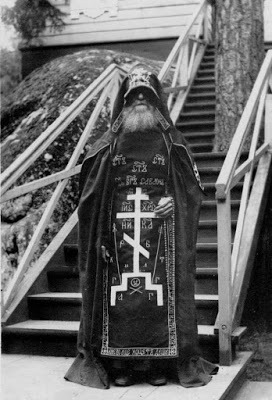
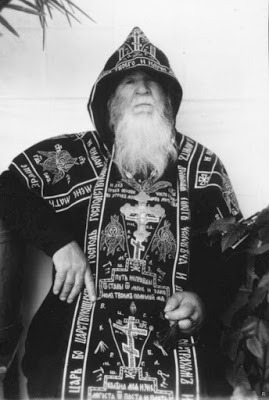
The άνάλαβος (analavos) is the distinctive garment of a monk or a nun tonsured into the highest grade of Orthodox monasticism, the Great Schema, and is adorned with the instruments of the Passion of Christ. It takes its name from the Greek αναλαμβάνω (“to take up”), serving as a constant reminder to the one who wears it that he or she must “take up his cross daily” (Luke 9:23). The ornately-plaited Crosses that cover the analavos, the polystavrion (πολυσταύριον, from πολύς, “many,” and σταυρός, “Cross”) — a name often, though less accurately, also applied to the analavos — reminds the monastic that he or she is “crucified with Christ” (Galatians 2:20).
With regard to each image on the analavos, the rooster represents “the cock [that] crowed” (Matthew 26:74; Mark 14:68 Luke 22:60; John 18:27) after Saint Peter had “denied thrice” His Master and Lord (John 13:38).
The pillar represents the column to which Pilate bound Christ “when he scourged Him” (Mark 15:15) “by Whose stripes we were healed” (Isaiah 53:5; I Peter 2:24).
The wreath garlanding the Cross represents the “crown of thorns” (Matthew 27:29; Mark 15:17; John 19:2) that “the soldiers platted” (John 19:2) and “put upon the head” (Matthew 27:29) of “God our King of old” (Psalm 73:13), Who freed man from having to contend against “thorns and thistles in the sweat of his brow” (Genesis 3:18-19).
The upright post and the traverse beam represent the stipes and the patibulum that formed “the Cross of our Lord Jesus Christ” (Galatians 6:14), upon which “all day long He stretched forth His hands unto a disobedient and gainsaying people” (Isaiah 65:2; Romans 10:21).
The four spikes at the center of the Cross and the hammer beneath its base represent the “nails” (John 20:25) and hammer with which “they pierced” (Psalm 21:16; John 19:37) “His hands and His feet” (Luke 24:40). when they “lifted up from the earth” (John 12:32) Him Who “blotted out the handwriting of ordinances that was against us by nailing it to His Cross” (Colossians 2:14).
The base upon which the Cross stands represents “the place, which is called 'Calvary' (Luke 23:33), or 'Golgotha', that is to say, the Place of the Skull” (Matthew 27:33), “where they crucified Him” (John 19:18) Who “wrought salvation in the midst of the earth” (Psalm 73:13).
The skull and crossbones represent “the first man Adam” (I Corinthians 15:45), who by tradition “returned unto the ground” (Genesis 3:19) at this very spot, the reason that this place of execution, “full of dead men’s bones” (Matthew 23:27) became the place where “the last Adam was made a quickening spirit” (I Corinthians 15:45).
The plaque on top of the Cross represents the titulus, the “title” (John 19:19-20), with “the superscription of His accusation” (Mark 15:26), which “Pilate wrote” (John 19:19) “and set up over His head” (Matthew 27:37); however, instead of “Jesus of Nazareth the king of the Jews” (John 19:19), which “was written over Him in letters of Greek, and Latin, and Hebrew” (Luke 23:38), the three languages being an allusion to the Three Hypostases “of the Father, and of the Son, and of the Holy Spirit” (Matthew 28:19), this titulus reads, “The King of Glory” (Psalm 23:7-10), “for had they known it they would not have crucified the Lord of glory” (I Corinthians 2:8).
The reed represents the “hyssop” (John 19:29) upon which was put “a sponge full of vinegar” (Mark 15:36), which was then “put to His mouth” (John 19:29) when in His “thirst they gave Him vinegar to drink” (Psalm 68:21), Him of Whom it was said that “all wondered at the gracious words which proceeded out of His mouth” (Luke 4:22).
The lance represents the “spear [that] pierced His side”; “and forthwith came there out blood and water” (John 19:34) from Him Who “took one of Adam's ribs, and closed up the flesh instead thereof" (Genesis 2:21) and Who “washed us from our sins in His own blood” (Revelation 1:5).
The plaque at the bottom of the Cross represents the suppedaneum of Christ, “His footstool” (Psalm 98:5), “the place where His feet have stood” (Psalm 131:7). It is slanted because, according to one tradition, at the moment when “Jesus cried with a loud voice, and gave up the spirit” (Mark 15:37), He allowed a violent death spasm to convulse His legs, dislodging His footrest in such a manner that one end pointed upwards, indicating that the soul of the penitent thief, Saint Dismas, “the one on His right hand” (Mark 15:27) would be “carried up into Heaven” (Luke 24:51), while the other end, pointed downwards, indicated that the soul of the impenitent thief, Gestas, “the other on His left” (Mark 15:27), would “be thrust down to Hell” (Luke 10:15), showing that all of us, “the evil and the good, the just and the unjust” (Matthew 5:45), “are weighed in the balance” (Ecclesiasticus 21:25) of the Cross of Christ.
The ladder and the pincers beneath the base of the Cross represent the means of deposition by which Saint Joseph of Arimathea, “a rich man” (Matthew 27:57) who “begged for the body of Jesus” (Matthew 27:58; Luke 23:52), “took it down” (Luke 23:53), so that as in body He descended from the Cross, so in soul “He also descended first into the lower parts of the earth” (Ephesians 4:9), “by which also He went and preached unto the spirits in prison” (I Peter 3:19).
Through these instruments, “the Cross of Christ” (I Corinthians 1:17: Galatians 6:12; Philippians 3:18) became the “Tree of Life” (Genesis 2:9; 3:22, 24; Proverbs 3:18, 11:30; 13:12; 15:4; Revelation 2:7; 22:2,14), by which the Lord Jesus reified His words that, “I am the resurrection, and the life: he that believeth in Me, though he were dead, yet shall he live, and whosoever liveth and believeth in Me shall never die” (John 11:25-26).
[source]
17 notes
·
View notes
Photo

Jeff Hardy vs. Abyss vs. Rhino vs. Sabu | Monster’s Ball match Bound for Glory October 23, 2005
45 notes
·
View notes
Note
what are your favorite quotes from john laurens?
I have particular inclination for his bitch-ier quotes, but nonetheless;
“You asked me, my dear father, what bounds I have set to my desire of serving my country in the military line? I answer glorious death, or the triumph of the cause in which we are engaged.”
— John Laurens to Henry Laurens [January 23, 1778]. From Washington's headquarters at Valley Forge. [x]
“The ambition of serving my country, and desire of gaining fame, leads me to wish for the command of men. I would cherish those dear, ragged Continentals, whose patience will be the admiration of future ages, and glory in bleeding with them.”
— John Laurens to Henry Laurens, [9 March 1778]. From Washington's headquarters at Valley Forge. [x]
“if it affects only a number of rich men & will contribute to equalizing estates I shall not regret it.”
— John Laurens to Henry Laurens, [February 24, 1778]. From Washington's headquarters at Valley Forge, about a fire that had wrecked Charleston the previous month. [x]
“I have been in several actions; I did not call that an action, as there was no action previous to the retreat.”
— John Laurens at Charles Lee's court-martial in July 1778. [x]
#amrev#american history#american revolution#historical john laurens#john laurens#quotes#queries#sincerely anonymous#cicero's history lessons
98 notes
·
View notes
Text
Day 6
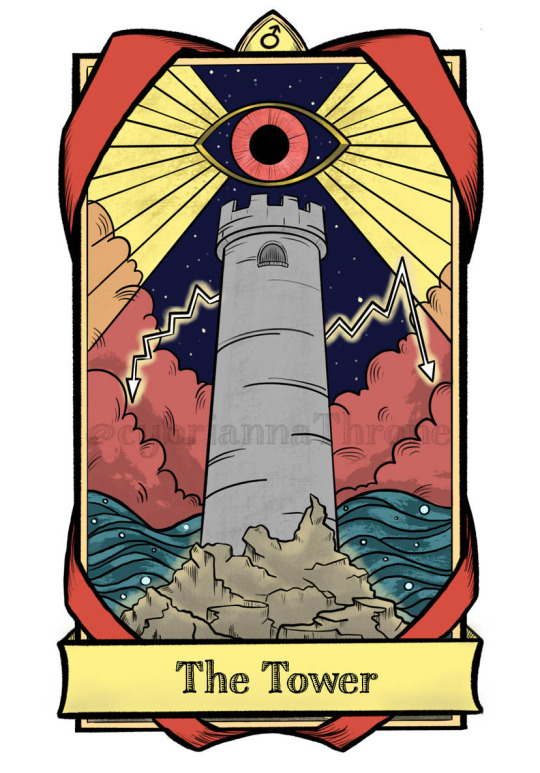
Liber Liberi vel Lapidis Lazuli Adumbratio Kabbalae Aegyptiorum sub figurâ VII
I
1. My God, how I love Thee!
2. With the vehement appetite of a beast I hunt Thee through the Universe.
3. Thou art standing as it were upon a pinnacle at the edge of some fortified city. I am a white bird, and perch upon Thee.
4. Thou art My Lover: I see Thee as a nymph with her white limbs stretched by the spring.
5. She lies upon the moss; there is none other but she:
6. Art Thou not Pan?
7. I am He. Speak not, O my God! Let the work be accomplished in silence.
8. Let my cry of pain be crystallized into a little white fawn to run away into the forest!
9. Thou art a centaur, O my God, from the violet-blossoms that crown Thee to the hoofs of the horse.
10. Thou art harder than tempered steel; there is no diamond beside Thee.
11. Did I not yield this body and soul?
12. I woo thee with a dagger drawn across my throat.
13. Let the spout of blood quench Thy blood-thirst, O my God!
14. Thou art a little white rabbit in the burrow Night.
15. I am greater than the fox and the hole.
16. Give me Thy kisses, O Lord God!
17. The lightning came and licked up the little flock of sheep.
18. There is a tongue and a flame; I see that trident walking over the sea.
19. A phœnix hath it for its head; below are two prongs. They spear the wicked.
20. I will spear Thee, O Thou little grey god, unless Thou beware!
21. From the grey to the gold; from the gold to that which is beyond the gold of Ophir.
22. My God! but I love Thee!
23. Why hast Thou whispered so ambiguous things? Wast Thou afraid, O goat-hoofed One, O horned One, O pillar of lightning?
24. From the lightning fall pearls; from the pearls black specks of nothing.
25. I based all on one, one on naught.
26. Afloat in the æther, O my God, my God!
27. O Thou great hooded sun of glory, cut off these eyelids!
28. Nature shall die out; she hideth me, closing mine eyelids with fear, she hideth me from My destruction, O Thou open eye.
29. O ever-weeping One!
30. Not Isis my mother, nor Osiris my self; but the incestuous Horus given over to Typhon, so may I be!
31. There thought; and thought is evil.
32. Pan! Pan! Io Pan! it is enough.
33. Fall not into death, O my soul! Think that death is the bed into which you are falling!
34. O how I love Thee, O my God! Especially is there a vehement parallel light from infinity, vilely diffracted in the haze of this mind.
35. I love Thee.
I love Thee.
I love Thee.
36. Thou art a beautiful thing whiter than a woman in the column of this vibration.
37. I shoot up vertically like an arrow, and become that Above.
38. But it is death, and the flame of the pyre.
39. Ascend in the flame of the pyre, O my soul! Thy God is like the cold emptiness of the utmost heaven, into which thou radiatest thy little light.
40. When Thou shall know me, O empty God, my flame shall utterly expire in Thy great N. O. X.
41. What shalt Thou be, my God, when I have ceased to love Thee?
42. A worm, a nothing, a niddering knave!
43. But Oh! I love Thee.
44. I have thrown a million flowers from the basket of the Beyond at Thy feet, I have anointed Thee and Thy Staff with oil and blood and kisses.
45. I have kindled Thy marble into life — ay! into death.
46. I have been smitten with the reek of Thy mouth, that drinketh never wine but life.
47. How the dew of the Universe whitens the lips!
48. Ah! trickling flow of the stars of the mother Supernal, begone!
49. I Am She that should come, the Virgin of all men.
50. I am a boy before Thee, O Thou satyr God.
51. Thou wilt inflict the punishment of pleasure — Now! Now! Now!
52. Io Pan! Io Pan! I love Thee. I love Thee.
53. O my God, spare me!
54. Now!
It is done! Death.
55. I cried aloud the word — and it was a mighty spell to bind the Invisible, an enchantment to unbind the bound; yea, to unbind the bound
Years favorite is in bold
Wow this is a doozy lol why all the tower cards remind me of the finale of the Magnus Archives
Artwork source https://www.deviantart.com/decepticoniancybra/art/The-Tower-Tarot-Card-871366781
10 notes
·
View notes
Text

Iskall aka Isgall “Kal” Bengrip.
Human Gunslinger(Guntank)17 Shield marshal 3 XP 307,200 (if used as npc for encounter)
Neutral (with chaotic tendencies) Medium Humanoid
Init +9; Senses Perception +43
HP214(20d10+100)
AC43(+6Shield+5Deviation+14Armor+5Natural+3Dex)
BaB+20 CMB+23 CMD+32
SavesFORT+20 REFL+25 WILL+30
Racial traits: Alchemically enhanced +1 Skill point/level
Traits: Competitive, Provincial.
Class abilities: Gunsmith, Grit(21 points), Improved armor and shield proficiency, Guntank’s resolve, Guntank’s resilience, Bullet deflection, Armor training 4, Technic training(one handed firearms, two handed firearms, heavy weaponry), deeds, Eye for detail, Legal judgement 1/day, Danger sense, Gun marshal, Labyrinthine cunning.
STR16 DEX28 CON20 INT20 WIS28 CHA7
Feats: Master crafter, Cosmopolitan(Draconic, Alko, Knowledge Arcana, Use magic device), Quick draw, Deadly aim, Extra grit, Technologist, Point blank shot, Precise shot, Rapid shot, Signature deed-Targeting, .
Skills: Acrobatics+32, Bluff+2, Climb+11, Craft(Stone and metal)+28, Diplomacy+6, Disable device+10, Intimidate+6, Handle animal+2, Heal+17, Knowledge (Arcana)+28 (Engineering)+28 (Local)+13, Perception +33, Profession(Architect)+22, Ride+14, Sense motive+22, Sleight of hand+17, Stealth+32, Swim+10, Survival+16, Use magic device+21.
Languages: Common, Orc, Dwarven, Draconic, Alko.
Equipment: Rail gun, Zero rifle, Zero pistol, Chainsaw, Autograpnel, 1000 Batteries, Adamantine longsword+5, Amulet of natural armor+5, Ring of protection+5, Mithral full plate of speed+5 Improved shadow, Living steel animated heavy shield+4, Ioun stones: Ioun torch, Lavender and green ellipsoid, Belt of physical might+6(Dex, Con), Cloak of resistance+4, Headband of mental prowess+6(Int, Wis, Arcana), Cybernetic eye, Beneficial bandolier, Wands(Recharge),Bag of holding II, Winged boots, Manual of quickness of action+2(used), Tome of understanding+4(used), Potions: Cure critical wounds(4), Heroism(4), Water breathing(1), Displacement(1), Gaseous form(1), Gunslinger kit, 723gp, 2 Huge ice elementals shaped like wolves, Certificate of Diorite critic.
Background: Iskall is an inhabitant of the land of hermits known for his fierce critic over diorite(he call it bird p**p) and cybernetic eye. Before joining into the land of hermits and making cool buildings “ice cold as he is” (as he defines himself) he participated in various competition of combat where he shined and was considered a master. Like a gladiator he had a great amount of glory and revels in it but decided to depart and have a change in life becoming the beloved, eccentric, funny and bubbly person that he is today. One day, while he was cleaning his house, he found a chest with some of his belonging from his days in the Arena. As he looked at it, memories runned through his being and also how he lost his eye and replaced it with a cybernetic one. “…glory of combat…” someone suddenly whispered in his ear. He looked around, but there was no one. “…you want it…” continued the whispering voice. “What is going on?! Who are you?!” Iskall started to panic as he pulled out his sword. “I am… CONFLICT… BATTLE… GLORY… BLOOD… HONOR… WAR…” A glow came out of the chest as one of the rusty weapons of Iskall was illuminating the room with a red gloomy light. “Admit it… you miss… the… THRILL.” Iskall looked at the weapon as the glow enveloped his face. “Do not… deny it… your past.” All the memories before becoming a hermit flooded his being. Guns ablaze, hot smoking metal, running, shooting, taking cover, the bloodshed, the rush of adrenaline. “Satisfy… your needs… sate mine… attain a wish…” another voice spoke “…bound only by your imagination.” Iskall hesitated at first, but then… he reached for the gun and he was catapulted into an arena where Pigmen stood atop the stairs in the Nether, shouting war chants… that he somehow understood. The warchief of the Pigmen stood up from his throne and shouted, his slaves opened the gates, and a flood of creatures poured in, and the battle started. “As I always said: Business in the front, party in the back!” And he aimed his rifle at a group of Pigmen.
Image made using Heroforge.
4 notes
·
View notes
Text
Fortune Eater

Image © Paizo Publishing, accessed at Archives of Nethys here
[I’m a big fan of composite undead; the caller in darkness was my favorite psionic monster of the 3.x era, and I have written a few myself (like the recent yānguĭ . So of course the fortune eater stood out to me. It, like the binumir, comes with plot hooks baked right in, and is an undead creature well worth having a conversation with (even if it really really wants you dead).]
Fortune Eater CR 7 CE Undead (incorporeal) This swirling mass appears to be multiple humanoid creatures, each of them warped and faded but carrying weapons and wearing armor.
A fortune eater represents the deaths of unlucky adventurers. When multiple heroes perish in short order, their spirits may become mired in the Material Plane and resolve as a fortune eater. These creatures are bound to existence by envy, and they obsessively stalk other adventurers in order to ruin their chances of glory. Fortune eaters tend to stake out places where adventurers might meet (taverns are a favorite), then stalk the heroes until an inopportune moment to appear and encompass them in their unluck auras. Others have a co-dependent relationship with some manner of powerful monster, helping it defeat all comers for little other reason than spite and jealousy.
Anyone near a fortune eater risks having their luck abandon them, snatching defeat from the jaws of victory. Worse, a fortune eater becomes luckier itself when it has victims of unluck, allowing it miraculous escapes from danger and lucky shots. The fortune eater can attack with multiple weapons at once, each the ghostly echo of a weapon or spell used by one of its component souls in life.
A fortune eater returns to its miserable existence if slain in combat. Only by playing a pivotal role in some heroic quest can the creature be allowed to pass into the afterlife. Their overall attitude of jealous rage, however, makes them poor allies for most adventurers, and they may have to be tricked or coerced into allowing themselves rest rather than be persuaded. Fortune eaters are notorious exaggerators, and their tales of how they met their deaths are often incomplete, distorted or outright lies.
At rest, a fortune eater resembles a large hooded humanoid. When combat begins, the faces and limbs of its component souls begin to swirl around it in a cloud.
Fortune Eater CR 7 XP 3,200 CE Large undead (incorporeal) Init +6; Senses all around vision, darkvision 60 ft., Perception +13 Aura unluck (20 ft., Will DC 18) Defense AC 19, touch 19, flat-footed 13 (-1 size, +6 Dex, +4 deflection) hp 68 (8d8+32) Fort +6, Ref +8, Will +10 Immune incorporeal traits, undead traits Defensive Abilities rejuvenation Offense Speed fly 30 ft. (perfect) Melee 3 phantom weapons +11 touch (1d8 plus 1d6 negative energy) Ranged 3 phantom weapons +11 touch (1d8 plus 1d6 negative energy) Space 10 ft.; Reach 5 ft. Statistics Str -, Dex 23, Con -, Int 15, Wis 14, Cha 18 Base Atk +6; CMB -; CMD 27 Feats Alertness, Deadly Aim, Iron Will, Weapon Finesse Skills Bluff +14, Fly +21, Intimidate +13, Perception +15, Perform (oratory) +10, Sense Motive +13, Stealth +11, Survival +8; Racial Modifiers +4 Bluff, +2 Perception Languages Common, Dwarven, Elven, Goblin SQ siphon luck Ecology Environment any Organization solitary or congregation (2-4) Treasure incidental Special Abilities Phantom Weapons (Ex) A fortune eater can attack with a phantom weapon as an attack action, and up to three phantom weapons as a full attack action. These are treated as natural weapons that resolve as touch attacks and deal 1d8 points of bludgeoning, slashing or piercing damage (as the fortune eater chooses) plus 1d6 negative energy damage. A fortune eater can use these attacks as melee attacks or as ranged attacks with a range of 120 feet and no range increment. A fortune eater can mix and match melee or ranged attacks in a single round, and does not take penalties or attacks of opportunity for using ranged phantom weapons in melee. Rejuvenation (Su) A fortune eater reforms at the site of its death 1d10 days after it is destroyed. If the fortune eater plays a pivotal role in resolving a heroic quest, the fortune eater is destroyed and its component souls pass into the afterlife. Siphon Luck (Su) As an immediate action when a creature subject to the fortune eater’s unluck aura rolls a d20 twice, the fortune eater can “store” the higher roll and choose to use it as the result of any d20 roll. A fortune eater can only store one roll at a time. Unluck Aura (Su) All living creatures within 20 feet of a fortune eater must succeed a DC 18 Will save or be subject to unluck. While remaining in the aura, the creature must roll all d20 rolls twice and take the worse result. A creature that succeeds its saving throw is immune to the unluck aura of that fortune eater for the next 24 hours.
41 notes
·
View notes
Text
Psalms chapter 104
1 Bless the LORD, O my soul. O LORD my God, thou art very great; thou art clothed with honour and majesty.
2 Who coverest thyself with light as with a garment: who stretchest out the heavens like a curtain:
3 Who layeth the beams of his chambers in the waters: who maketh the clouds his chariot: who walketh upon the wings of the wind:
4 Who maketh his angels spirits; his ministers a flaming fire:
5 Who laid the foundations of the earth, that it should not be removed for ever.
6 Thou coveredst it with the deep as with a garment: the waters stood above the mountains.
7 At thy rebuke they fled; at the voice of thy thunder they hasted away.
8 They go up by the mountains; they go down by the valleys unto the place which thou hast founded for them.
9 Thou hast set a bound that they may not pass over; that they turn not again to cover the earth.
10 He sendeth the springs into the valleys, which run among the hills.
11 They give drink to every beast of the field: the wild asses quench their thirst.
12 By them shall the fowls of the heaven have their habitation, which sing among the branches.
13 He watereth the hills from his chambers: the earth is satisfied with the fruit of thy works.
14 He causeth the grass to grow for the cattle, and herb for the service of man: that he may bring forth food out of the earth;
15 And wine that maketh glad the heart of man, and oil to make his face to shine, and bread which strengtheneth man's heart.
16 The trees of the LORD are full of sap; the cedars of Lebanon, which he hath planted;
17 Where the birds make their nests: as for the stork, the fir trees are her house.
18 The high hills are a refuge for the wild goats; and the rocks for the conies.
19 He appointed the moon for seasons: the sun knoweth his going down.
20 Thou makest darkness, and it is night: wherein all the beasts of the forest do creep forth.
21 The young lions roar after their prey, and seek their meat from God.
22 The sun ariseth, they gather themselves together, and lay them down in their dens.
23 Man goeth forth unto his work and to his labour until the evening.
24 O LORD, how manifold are thy works! in wisdom hast thou made them all: the earth is full of thy riches.
25 So is this great and wide sea, wherein are things creeping innumerable, both small and great beasts.
26 There go the ships: there is that leviathan, whom thou hast made to play therein.
27 These wait all upon thee; that thou mayest give them their meat in due season.
28 That thou givest them they gather: thou openest thine hand, they are filled with good.
29 Thou hidest thy face, they are troubled: thou takest away their breath, they die, and return to their dust.
30 Thou sendest forth thy spirit, they are created: and thou renewest the face of the earth.
31 The glory of the LORD shall endure for ever: the LORD shall rejoice in his works.
32 He looketh on the earth, and it trembleth: he toucheth the hills, and they smoke.
33 I will sing unto the LORD as long as I live: I will sing praise to my God while I have my being.
34 My meditation of him shall be sweet: I will be glad in the LORD.
35 Let the sinners be consumed out of the earth, and let the wicked be no more. Bless thou the LORD, O my soul. Praise ye the LORD.
3 notes
·
View notes
Text
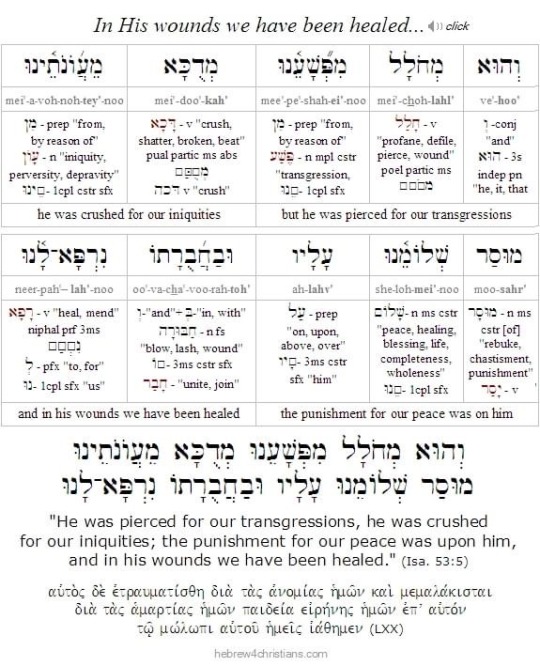
"For Christ our Passover is sacrificed for us;
therefore let us keep the feast." (1 Cor. 5:7-8)
====
Some well-meaning Christians think that followers of Yeshua have no reason to do a Passover Seder as instructed in the Torah because, in light of the new covenant, all that is now needed is to remember Jesus’ crucifixion for our sins and to celebrate his resurrection by partaking in the sacraments. This viewpoint assumes that, despite the instructions in the Torah, the yearly Passover service, or seder, is not intended for Christians, since it focuses on the Exodus from Egypt and the Jewish people, and the message of the gospel is universal, for every "tongue and tribe." Moreover since Christians are no longer "under the law," they are not obligated to keep the ordinances of the "Old Testament," especially with regard its ceremonial laws.
There are some real difficulties when we disregard the Torah's instructions to observe the Passover, however, particularly because Yeshua himself identified his entire ministry as the “Lamb of God” who redeems us from the curse of the law, and he used the message of the Passover to teach his followers this truth. Bear in mind that the idea of the Passover was not enacted at Sinai as part of the Sinai covenant, but predates the giving of the law. In other words, the faithful of Israel obeyed God's instruction to take refuge under the blood of the sacrificed lamb to escape the plague of death delivered upon Egypt, but this was done before Moses ascended Sinai to receive and ratify the covenant of the law.
Indeed the theme and message of Passover is timeless for understanding the Bible. The message was delivered in the Garden of Eden when God sacrificed a lamb to cover the shame of Adam and Eve (Gen. 3:21); it was prefigured in the lamb that was sacrificed by Abraham in place of Isaac during the Akedah; it was portrayed in the blood of lamb sacrificed in Egypt whose blood was daubed upon the doorposts; it was memorialized every day and night at the Tabernacle (and later at the Temple) as "continual korban," the offering of which was central to the sacrificial ministrations for Israel; it was foretold by the Hebrew prophets (Isa. 9:6; Isa. 53; Psalm 22:16; Prov. 30:4; Zech. 12:10. etc.), and it was fully manifested in the incarnation, mission, and sacrifice of God's beloved Son himself, the promised heir to come who allowed himself to be "caught in the thicket" for our sins, and who was bound upon the altar of the cross to shed his blood for our redemption. This was the central meaning of the “greater exodus” that Yeshua discussed with Moses and Elijah on the mount of transfiguration before his crucifixion (see Luke 9:29-31). Amen, Yeshua as our sacrificial Lamb is heart of the gospel message itself (John 1:29; 1 Pet. 1:19; Isa. 53:3-12); it’s the “scarlet thread” he showed his followers (Luke 24:27); it’s the Metaphor God chose to make his sacrificial love known to us.
The image of "Christ our Passover Lamb" (המשיח פסח שלנו) will extend forever and unto eternity itself, when the Lamb of God is fully glorified and enthroned, as it says: "For the Lamb on the throne will be their Shepherd. He will lead them to springs of life-giving water. And God will wipe every tear from their eyes" (Rev. 7:17). "And the city has no need of sun or moon, for the glory of God illuminates the city, and the Lamb is its light" (Rev. 21:23).
The meaning and substance of Passover, then, is essential to the life of the Christian, and to dismiss its significance is to risk missing the point of God's redemption and salvation itself. The Apostle Paul used “Passover language” to describe our new life in Messiah by admonishing us to: "purge out the old leaven, that you may be a new lump, since you truly are unleavened. For indeed Christ, our Passover, was sacrificed for us. Therefore let us keep the feast, not with old leaven, nor with the leaven of malice and wickedness, but with the unleavened bread of sincerity and truth" (1 Cor. 5:7-8).
The LORD did not waste his breath by revealing the Torah to Israel, nor did he speak out of two sides of his mouth when he instructed them to keep the Passover holiday every year (Num. 9:2,14; Lev. 23:5; Deut. 16:1). Remember - Jesus was the Voice of God speaking to Israel at Sinai; Jesus was Moses' Teacher regarding the seven holidays of the Torah! He said "Do not think that I came to destroy the Law or the Prophets. I did not come to destroy but to fulfill. For assuredly, I say to you, till heaven and earth pass away, one jot or one tittle will by no means pass from the law till all is fulfilled. Whoever therefore breaks one of the least of these commandments, and teaches men so, shall be called least in the kingdom of heaven; but whoever does and teaches them, he shall be called great in the kingdom of heaven" (Matt. 5:17-19). Heaven and earth has not yet passed away, and therefore the Torah has its voice and place in the life of follower of Yeshua. Faith does not mean we are devoid of law of God, even if the verdict of the law reveals our sin. As the Apostle Paul said, "Do we then make void the law through faith? Certainly not! On the contrary, we establish the law" (Rom. 3:31). We are justified by trusting in the righteousness of God in the sacrifice of Yeshua, but that does not mean we disregard God's law so that "grace may abound" (Rom. 6:1-2)
So you see that the question of whether Christians should seriously engage the Passover turns on how they read the Scriptures, and in particular, how they esteem the words of the Torah. If they tend to read the Bible out of context, by focusing on the New Testament without taking time to carefully consider the context given in the Hebrew Scriptures, they likely will dismiss the significance of the Passover Seder and will think of it in theologically abstract terms, as an analogy or metaphor foretelling what Yeshua has done, and that it is now best remembered during communion rituals, rather than as an invitation to participate in the annual retelling of the great story of redemption that is the heritage of the people of God. But Yeshua himself observed the Passover with his disciples, and indeed his last Passover before his crucifixion represented his most intimate heart to us. We miss a lot if we minimize the significance of the Passover or regard it as somehow incidental to our life as believers in the great Lamb of God. Chaverim -- let us keep the feast! Shalom lekha.
[ Hebrew for Christians ]
21 notes
·
View notes
Text
Devotional Hours Within the Bible
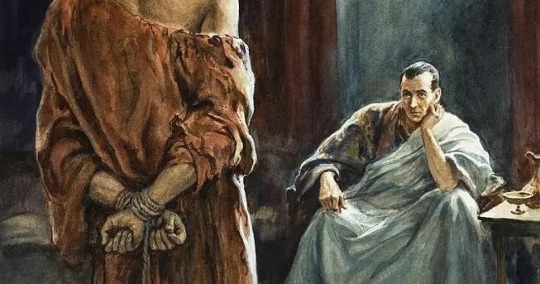
by J.R. Miller
Christ’s Trial before Pilate (Mark 15:1-15)
We speak of Christ’s trial before Pilate. But really, it is Pilate’s trial before Christ that is described in our Scripture. The narrative holds up the Roman governor in such a blaze of light, that all the world can see him. The story of this trial begins in the early morning, when Jesus was led to Pilate. During the night, the religious rulers had informally condemned Him to death but they could not carry out their own sentence without bringing their prisoner to the Roman governor. This was one of the humiliating conditions of their subjection to the Romans. Meanwhile Jesus had been kept under guard during the morning hours, and had been cruelly mocked by the soldiers.
It was during this time that Peter’s denial occurred, and the pain of the disciples’ words as they fell upon Christ’s ears was more severe than all the mockeries of the heathen soldiers.
As the first streaks of dawn appeared in the east, the members of the Sanhedrin were together again to hasten the formalities, so as to get Jesus on the cross at the earliest possible moment.
When Jesus was taken to Pilate, He was bound. The rulers supposed that their cords would hold Him. Knowing as we do who this Prisoner was, we are sure that no chains of earth could have held him, if He had put forth His power, and therefore, that their bonds were useless. We understand also that this quiet submitting to be seized and led away was entirely voluntary. He was led as a lamb to the slaughter, not resisting, exerting no power in His own defense, though omnipotence was His because he was laying down His life for us.
But what a strange picture this is the Son of God bound, manacled as a common prisoner, and led away under arrest! What humiliation! But did they shackle the arms of His power with their chains? Did they stain the radiance of His glory with the shame they put upon His name that day? We know that while He Himself wore chains, submitting to them He is able to break our bonds and set us free.
The rulers had told Pilate, that Jesus claimed to be a king. They thus sought to secure Pilate’s consent to His execution, as one who was disloyal to Rome. “Are You the King of the Jews?” asked the governor, referring to what His accusers had charged. Jesus did not look much like a king as He stood there, His hands tied and a cord about His neck. Pilate’s question sounds like ridicule. Yet Jesus answered calmly, “Yes, it is as you say.” Where was His kingly power ? Where was His throne ? Where did His kingdom lie? These questions are not hard to answer today. Millions now bow to Him and worship Him as King of their souls. In heaven He is honored and adored as King of kings. On earth, too, His sway is felt even where He is not acknowledged. His influence has permeated all lands. Righteousness, truth, love, and grace are the characteristics of his reign, and these qualities are entering more and more into the life of all the world.
When the chief priest accused Jesus before Pilate, Jesus made no reply. Pilate could not understand His silence, and so endeavored to induce Him to speak. “Behold how many things they witness against You.” But still He was silent. “Jesus made no reply,” the record says. We cannot too often remind ourselves of the wisdom of silence under false accusation .
It is told of one in the olden times, that when most grievously and falsely accused by enemies, he refused to give even one word of denial or to offer any proof whatever of innocence, saying that God knew all about it, and that if it was God’s will that he should live under the shame, he would do it in silence, like his Master on his trial. This is what a Christian should usually do when falsely accused, perhaps not even offering explanation.
Jesus at least answered nothing but “committed Himself to Him that judges righteously” (1 Peter 2:23). That is, He left His name, His life, and the whole matter of His vindication to His Heavenly Father. There is no spot now on His name, though He died as a malefactor. So we may trust ourselves in God’s hands when we are wrongly accused, answering nothing but committing the whole matter to Him who judge us righteously.
Pilate was aware from the beginning, that the rulers really had no case against Jesus. If he had been courageous and just, he would have delivered Him out of the hands of His enemies. But he could not forget his own personal interests, and tried in various ways to circumvent the question of decision. He saw clearly the motive of the rulers. “For he knew that the chief priest had delivered him out of ENVY.” The rulers were envious of the influence of Jesus with the people. Envy has led many to a crime. It was envy that led Cain to slay his brother Abel. It was envy that caused Joseph’s brothers to hate him and to sell him as a slave, to get him out of their way. In many a school a bright scholar is disliked and even persecuted in many ways, because of the envy of his schoolmates. In business the successful man is followed by the envy and the enmity of rivals. In society a popular young person is often assailed by those who are outshone. Many a good name is blackened by envy. We should be on our guard continually against this sinful tendency in our hearts.
One of the expedients to which Pilate resorted in his effort to release Jesus indirectly, without exerting his own authority, was to get the people to choose Him as the one prisoner to be set free at that Passover. But the rulers, determined on the death of Jesus, insisted upon the release of Barabbas, a noted criminal. “Jesus or Barabbas?” was now the question. Barabbas was a robber and murderer. He had been engaged in an insurrection against the Romans, probably was chief in the band. His condemnation was just. Jesus never had done anything, but bless men and do them good. No enemy could say a word against Him. No witness had testified that ever He had done the least unkindness to any human being. Yet the people did not hesitate in their choice. They chose the guilty, blood-stained criminal for friendly recognition and freedom and sent the pure, holy, and gentle Jesus to dishonor and death! Every one of us has to make a similar choice between Jesus, the holy, blessed, living glorious One and sin. Which are we choosing?
This determined choice of Barabbas for freedom, still left Jesus on Pilate’s hands. He was disappointed. He had hoped to get clear of deciding in His case. He was compelled now to do something, either to assert his power and set Him free or yield to the people’s clamor and send Him to the cross. “What shall I do, then, with the one you call the king of the Jews ?” Pilate’s question is a question which every one of us must answer we must do something with Jesus. We take Him to our hearts, to the highest place of love and honor or we must reject Him. What shall we do with Him? Before every one of us He stands waiting at our door, and we must ask and answer this very question, “What shall I do with Jesus?” He comes to us in every gentle and gracious way to be our Savior, our Friend, our Lord, our Guide and we must either accept Him or reject Him. We may postpone our answer but delay does not rid us of the question it only pushes it forward, and when we go on a little we shall meet it again. The question must be answered either by our acceptance, or by our rejection of Christ. Not accepting, is really rejecting; and, therefore, while we think we have not answered the question, we really have answered it. We should think seriously what the rejection of Christ involves. We know what it involved for Pilate. What will it involve for us? Would we crucify Him afresh?
At length Pilate yielded to the pressure of the rulers and gave sentence that Jesus should be crucified. He did it, we are told, wishing to calm the multitude. That was Pilate’s opportunity. He was the one man in all the world, who could send Jesus to the cross. No other one could do it. It was a fatal and terrible distinction that was his, among men. Whether Jesus should have justice and be set free or should die innocently, he had to settle. The Jews could not touch Jesus without Pilate’s consent.
We know what he did with his opportunity. He had not the courage to be true, to be just to protect the innocent, to maintain right. He knew well that Jesus had done nothing worthy of punishment. He struggled feebly for a time with his conscience, and then gave way, sentencing to death as a malefactor, a man he knew to be without sin or fault! Thus he lost his opportunity to do justice and to win for himself an immortality of honor. He went through the farce of washing his hands before the rulers, saying that he was not responsible. But the stain upon his soul no water could wash off; the brand of dishonor marks his name with an immortality of shame. The lesson is for us. We have our opportunity to stand for truth and right. What shall we do with Jesus, who is called the Christ?
13 notes
·
View notes
Text

22nd February >> Mass Readings (Except USA)
Feast of Saint Peter's Chair
(Liturgical Colour: White: B (2))
First Reading 1 Peter 5:1-4 Watch over the flock, not simply as a duty but gladly.
Now I have something to tell your elders: I am an elder myself, and a witness to the sufferings of Christ, and with you I have a share in the glory that is to be revealed. Be the shepherds of the flock of God that is entrusted to you: watch over it, not simply as a duty but gladly, because God wants it; not for sordid money, but because you are eager to do it. Never be a dictator over any group that is put in your charge, but be an example that the whole flock can follow. When the chief shepherd appears, you will be given the crown of unfading glory.
The Word of the Lord
R/ Thanks be to God.
Responsorial Psalm Psalm 22(23)
R/ The Lord is my shepherd: there is nothing I shall want.
The Lord is my shepherd; there is nothing I shall want. Fresh and green are the pastures where he gives me repose. Near restful waters he leads me, to revive my drooping spirit.
R/ The Lord is my shepherd: there is nothing I shall want.
He guides me along the right path; he is true to his name. If I should walk in the valley of darkness no evil would I fear. You are there with your crook and your staff; with these you give me comfort.
R/ The Lord is my shepherd: there is nothing I shall want.
You have prepared a banquet for me in the sight of my foes. My head you have anointed with oil; my cup is overflowing.
R/ The Lord is my shepherd: there is nothing I shall want.
Surely goodness and kindness shall follow me all the days of my life. In the Lord’s own house shall I dwell for ever and ever.
R/ The Lord is my shepherd: there is nothing I shall want.
Gospel Acclamation Matthew 16:18
Glory and praise to you, O Christ! You are Peter, and on this rock I will build my Church. And the gates of the underworld can never hold out against it. Glory and praise to you, O Christ!
Gospel Matthew 16:13-19 You are Peter and on this rock I will build my Church.
When Jesus came to the region of Caesarea Philippi he put this question to his disciples, ‘Who do people say the Son of Man is?’ And they said, ‘Some say he is John the Baptist, some Elijah, and others Jeremiah or one of the prophets.’ ‘But you,’ he said ‘who do you say I am?’ Then Simon Peter spoke up, ‘You are the Christ,’ he said ‘the Son of the living God.’ Jesus replied, ‘Simon son of Jonah, you are a happy man! Because it was not flesh and blood that revealed this to you but my Father in heaven. So I now say to you: You are Peter and on this rock I will build my Church. And the gates of the underworld can never hold out against it. I will give you the keys of the kingdom of heaven: whatever you bind on earth shall be considered bound in heaven; whatever you loose on earth shall be considered loosed in heaven.’
The Gospel of the Lord
R/ Praise to you, Lord Jesus Christ.
3 notes
·
View notes
Note
"How long?...Since the beginning." With Copiiia pls!
-spot/23
I got you
Tag: copiiia , angst , comfort
Terzo shakes his head in disbelief he stood over facing the window as his hand supports himself on his table , he was shaking and Copia could see that. It broke his heart as well, maybe he shouldn’t have said it.
“How long…did you know about this?”
Copia sighs and tugs on his leather glove. “Since the beginning…”
“And you never thought to tell me about this? Not even a ‘hey Terzo you are going to die within a few weeks’ huh?” The former Papa turns, still wearing his regal coat that he took pride in when he was alive.
The gold thread on his neck seems to glimmer under the light. If it weren’t for the situation they’re in now , Copia would have approach and kiss every seam on the other man’s neck.
But he stayed on the couch, trying to make himself as small as possible. “I didn’t had the chance to, I tried calling you on your, I tried even sending you letters , calling Kevin even to inform you! But it didn’t break through…”
Terzo grits his teeth. What’s done is done and now he stood there in what once was his office , now Copia’s . An Undead Papa in his past glory.
“I begged them, I did. I went out of my way to find your body again, to do your ritual. I feel so terrible…you can’t be left like …you once were.” The Cardinal covers his face with his hands, trying not to sob.
Terzo softens and kneels in front of him, touching his knees. Copia let’s his hands falters to face Terzo with his glassy eyes.
“I loved you too much to let you go.”
The former Papa nods before he pulls Copia in for a hug, Copia buries himself into him, softly sobbing.
“I know Copia , I know…it’s alright. Besides Omega, you’re the only one who cared about me.”
Sniffles and nods were heard as Copia hugs him back.
“And now you’re going to be stuck with me, possibly forever, until the end of times. Bounded.” Terzo whispers softly, knowing the circumstances of his ritual.
“I know what I did, and I have no regrets over it.”
11 notes
·
View notes